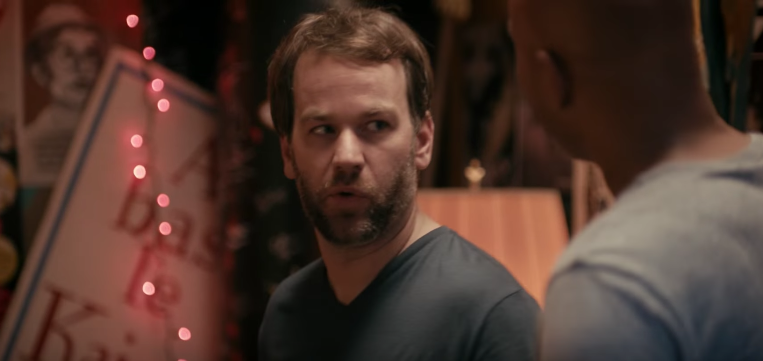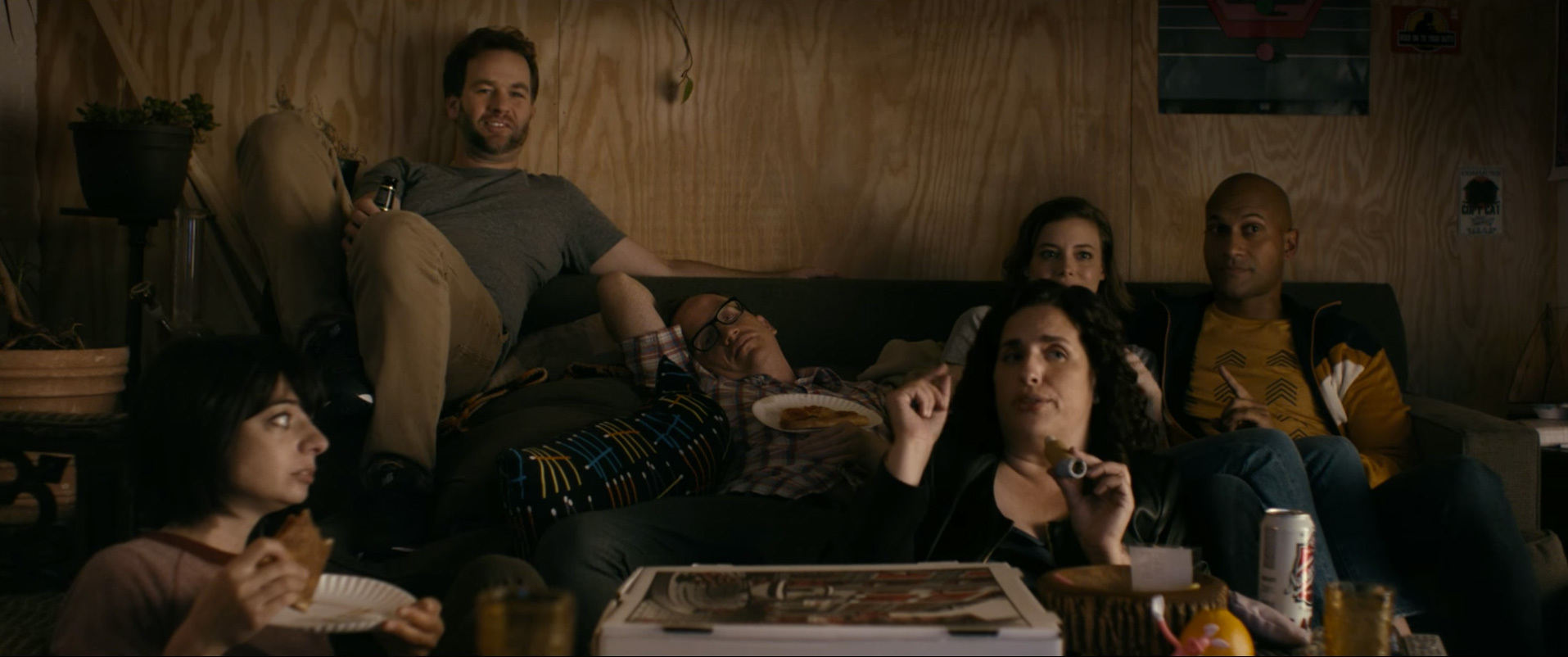At the time of my conversation with director, actor, and comedian Mike Birbiglia, his new movie, Don’t Think Twice, had already broke indie box office records. Why? Well, a couple reasons.
Firstly, it beautifully captures the intersection of envy, pain, and ambition in the sketch comedy scene. It’s set in New York City, but these characters — hard-working, funny, aimless — could just as easily be vying for attention in Los Angeles or Chicago.
The second reason for the film’s financial success is bit easier to articulate: Birbiglia is a hustler. Full-stop. For the past two months, the multi-talented artist has traveled across the country promoting the movie through Q&As, live sketch shows, and more. And you know what? It’s worked.
Birbiglia’s sophomore film essentially guarantees a third (knock on wood), and hopefully a fourth, and so on. But his tireless efforts to get the movie out in front of American audiences has also left him, well, tired. I noticed his demeanor the moment he sat down — enervated, drained, and yet still warm. So, we start there.
You seem stressed out and exhausted.
Frazzled. I’m on very little sleep. I did 28 Q&As this weekend.
I imagine the tour for this movie is taking a toll on you.
It’s an independent film, you know. You really have to deliver it to people. I always say this at the Q&As, you are the ad budget. You don’t have an ad budget. If they show up and tell their friends then people will see the movie. It’s very hard for an independent film to get people to show up.
This is a step up from Sleepwalk With Me in scale. Is it a better movie?
Yeah. When we finished the picture, I was walking down the street with Ira [Glass] at like one in the morning or something, and I go, “I think it’s better than Sleepwalk With Me,” and he goes, “It’s much better. It’s not even close.” I was like oh, okay. I don’t know, it had just occurred to me. I didn’t know it was so obvious. He was like, “No, it’s just more complex. There’s more characters, it’s more cinematic, it’s more everything.”
Sleepwalk With Me is more you though right?
It’s more me, and then this is someone else. That’s why I can’t watch the movie anymore, I cry. I cry every fucking time.
It’s funny. Before you came in here Kate Micucci — kinda like your films — was offering up a lot of life advice.
That makes sense. You need it. You’re young, you need a lot of life advice.
Do you think we get to an age where we don’t need life advice?
No, no no no. I think that’s the biggest sort of mistake I’ve seen artists and peers make. They think that they’re done. They think they’ve sort of “figured it out,” artistically or life-wise, and it’s like no, nobody’s ever figured it out. If you stop learning, you’re dead.
You’ve figured it out a little bit more, though, right?
Yeah, I’m better than I was, but I’m going to be hopefully better in the third [film], better in the fourth, and hopefully make about ten.
Do you think you’re more comfortable with yourself now?
I’m more comfortable as a director knowing that I can confidently tell people on the set, like, “I will deliver this movie. Don’t worry. I got this. You just do your part and I’ll deliver the movie.”
Was it a tough transition from doing stand-up to being a director?
It’s really hard, nearly impossible. When you direct your first feature, you have no track record or history, so I would say to the actors, “I think I’m going to deliver this movie. I’ve delivered in other capacities and this is my first film. I’ve done stand-up, I’ve done one-person shows, but I’ve never done this. But trust me.” You know, some people do, some people don’t. On the second one they’ve seen the first one and they go, “Oh, I trust you.” First movies are hard. Even when you look at some of the best directors.

What’s more grueling to work on, standup or these screenplays?
Movies are much harder. Standup flows more. It flows from being on stage, you work off the energy of the audience, there’s a degree to which you can improvise. If things get a laugh, I’m audio recording and I change it every night. There’s very little planning that goes into it. You show up, you get on stage, you do ten minutes at the Comedy Cellar where I’ll work out material, or an hour at union hall. I write, and then I get on stage and I say stuff, but with movies it’s like you’re choreographing a hundred different people doing their art simultaneously, whether it’s sound design, production design, cinematography, acting. You have to be the conductor of the symphony that is a group of filmmakers. It’s nearly impossible. It’s any wonder that any movie is ever good.
Are you a demanding leader?
You should ask the other guys. I think they might say I am. But I’m also respectful. I very much respect what actors do. What these five people did is they really gave their souls to the performances, and it’s asking a lot, right? They really gave themselves to it. I feel really lucky that they did it, and I feel that way about all 75 or 100 crew people too. Everybody gave themselves to it and worked toward telling this story and nobody was getting rich off it. Everyone was working for probably less than they usually make and committed themselves fully to it, and they didn’t have to.
And I got lucky. There’s a lot of things that fell in our favor. Our improv coach, Liz Allen, is a close friend of Tami’s and came to town and coached our improv group and meshed with Gillian really well. Gillian had never done improv, so she was teaching her improv for the first time, and it was like, “Where are you from?” “Pittsburgh.” “What part of town?” “Same part of town.” “What neighborhood?” “Same neighborhood.” “What street?” “Same street.” “What house?” “Same house.” “What bedroom did you sleep in?” “Same bedroom.” Liz’s mom had sold the house to Gillian’s mom, and then she’s teaching her improv. The statistically probability of it is so infinitesimally small. So there’s a lot of stuff like that with the movie, where it’s like yeah, I wrote twelve drafts of the script, but then that happened, so I can’t take credit for that.
You said you’re lucky they gave themselves to the project, but they were giving themselves to you.
Yeah, but they were giving themselves to the story.
[Mid-interview, Mike apologizes while taking a brief Facetime call from his wife, producer Jen Stein, and their baby daughter Oona]
It’s like this new thing with parenting where you have to take the call no matter what, because if it’s an emergency then you’re the person.
Are you good with parenting?
I think so, yeah.
You have dad vibes for sure.
I play dads in films.
Maybe that’s why I’m saying that, but there’s something wholesome about you. You don’t seem like a dishonest person. You don’t seem like an asshole.
I’m not an asshole. I had a no assholes policy on this film. No assholes in the crew, no assholes in the cast. When I had my first crew meeting, which was huge, it’s so many people, I say, “Congratulations, you’re not an asshole. I vetted all of you. I called people from your past. If you start acting like an asshole, we’re going to be confused and you probably won’t work on the movie anymore.”

You should keep that policy.
I will. Life is too short. That’s another Hollywood thing that I don’t want to deal with. A lot of these bankable actors are people who you have a long list of stories about, where you’re like, “Ugh, I have to put up with that?”
I’m fascinated by how much this movie is about the two sides of the coin, envy and, “Good job, you did it friend!” It’s a hard thing to navigate. Do you have problems navigating that?
Yeah, I think I’m jealous of people, aspects of people.
Who are you really jealous of?
I think that I get envious of facets of what people are able to do, you know what I mean? When Louis C.K. got rid of Ticketmaster on his tour, I was like fuck, that’s impressive, because I’ve been dealing with that for years. I hate Ticketmaster and people complain to me on Twitter and Facebook like, “Your ticket cost thirty bucks but then after Ticketmaster it’s fifty-five dollars.” And I’m like, “I don’t know what to tell you, but I’m sorry. I don’t see any of that money, I don’t know what to tell you.” And then Louie figured out a way to get rid of it from his thing, and I’m like, “Oh, man, that is impressive.”
Sometimes, and I won’t speak to who this happens with, you get upset; it’s so wrongheaded and useless of an emotion [but] you get mad about what is popular. How is that popular?
Are you talking about Donald Trump?
Kind of. Donald Trump is a good political example.
What’s more frustrating to me is that I inexplicably care about what’s popular, even when I know it’s a waste of time.
It doesn’t matter! That’s exactly right. It doesn’t matter what people like. I even have it with other independent films. I’m like, “How come Captain Fantastic and Tickled aren’t the most popular movies in America? How come Batman vs. Superman is?” I haven’t even seen that movie, but it’s like, how come that movie made $100 million and Captain Fantastic makes $3 million.
At the end of the day you have to just be thankful for what you have. So long as you’re not homeless and you’re making another movie, that’s good.
I know, I’m with you. I feel that way about a ton of independent films. Fortunately, in this marketplace, even with comedians, people who I used to be like, “How come that person’s not more popular?” are more popular now. Like Maria Bamford was always one of those. You were like, she’s brilliant, how come she’s not the most popular comic? Now she’s pretty huge.
Credits
Text Sam Fragoso
